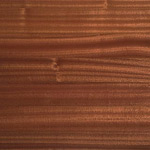Serving Upstate NY—VT—MA • For selections & prices, CALL or EMAIL US
Sapele
Wood Flooring Species
Scientific Name:
Entandrophragma cylindricum
Other Names and Species:
Aboudikro
Libuyu
Muyovu
Penkwa
Sapelli
Sapelii
Origin:
West and East Africa, from the Ivory Coast to the Cameroons and eastward through Zaire to Uganda.
Appearance:
The sapwood of sapele tends toward whitish or pale yellow and is distinct from the heartwood, which ranges in color from a medium to dark reddish or purplish brown. Sapele is lustrous and fine-textured, with an interlocked grain that is sometimes wavy, producing a narrow, uniform roe figure on quartered surfaces. When cut, it has a cedar-like scent.
Properties:
Sapele is quite durable and seasons rapidly, but with a marked tendency to warp, so careful stacking is required.
Janka Hardness: 1510
Sapele is about four percent harder than hard maple, roughly eleven percent harder than white oak, about fifty-one percent harder than teak, close to four percent harder than sugar maple, twenty-one percent softer than jarrah, and about twenty-two percent as hard as santos mahogany’s ranking of 2200.
Workability:
This wood works equally well with hand and machine tools, and it saws and finishes easily. However, planing the surface tends to tear the interlocked grain. Sapele has good nailing and gluing properties.
Principal Uses:
Sapele is most commonly found in wood flooring and paneling, decorative veneers, furniture, and cabinetwork.
Learn more about available grades of
Sapele hardwood flooring »





